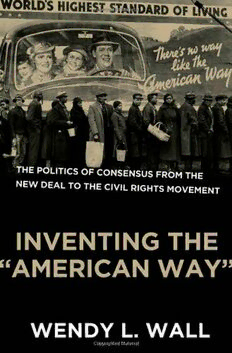
Inventing the "American Way": The Politics of Consensus from the New Deal to the Civil Rights Movement PDF
395 Pages·2008·4.054 MB·English
Most books are stored in the elastic cloud where traffic is expensive. For this reason, we have a limit on daily download.
Preview Inventing the "American Way": The Politics of Consensus from the New Deal to the Civil Rights Movement
Description:
This is an important book that reconceptualizes the nature of modern politics. The traditional interpretation privileges the creation of an American unity that resulted from the earliest trials of the Cold War and gave rise to a particular brand of American exceptionalism. That exceptionalism mixed civil religion, affluence, and core values to create the consensus of a modern America as reflected in the post-Cold War era. The author directly challenges this interpretation and situates the American character and consensus in an earlier era, the crises of the Great Depression, rising Marxism and fascism, and a splintering society being torn apart by economic hardship. In this crisis, Wall asserts, Americans of all political persuasions, economic backgrounds, religions, and ethnic and racial origins latched onto a single unifying "American Way" to rescue the U.S. experiment. Terms such as democracy, free enterprise, the Judeo-Christian tradition, and patriotism gained new meaning as the predominant set of assumptions of the era. They gained credence as a means of ensuring national coherence and identity. This is a well-crafted thesis that offers an important new perspective.
See more
The list of books you might like
Most books are stored in the elastic cloud where traffic is expensive. For this reason, we have a limit on daily download.
